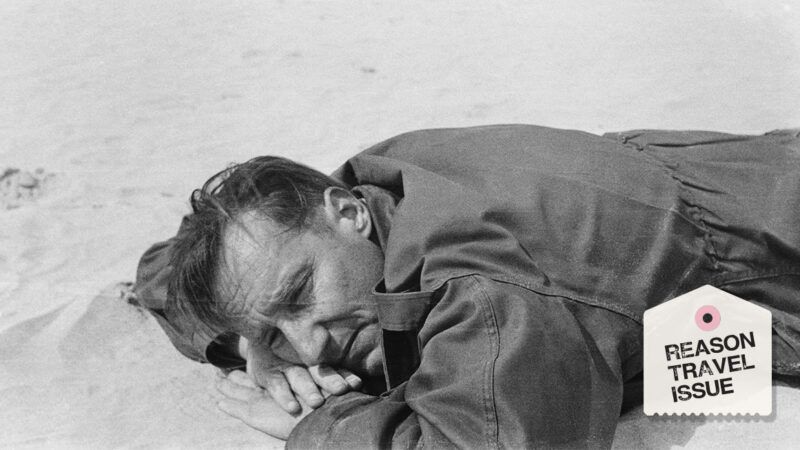A Beatnik Tourist in Ayahuasca Country
William Burroughs and Allen Ginsberg's trip reports form one of the most entertaining books in the Beat canon.

The Yage Letters, by William Burroughs and Allen Ginsberg, City Lights, 68 pages, $8–$54 used
Long before it was popular for New Age norteamericanos to visit the Andes Mountains seeking psychedelic enlightenment from ayahuasca, the Beat novelist William Burroughs made the trek. But he took the journey in 1953, when the literary template for a psychonautic vision quest had not yet been set—not that a grumpy cynic like Burroughs was likely to write that way in the first place. Instead his account feels like the diary of an easily aggravated American tourist with firm views on the quality of the local hotels, officials, "god awful greasy food," and prostitutes.
I say that as an endorsement. I yield to no one in my affection for mind-bending dispatches from inner space, but Burroughs' bitter commentary makes for much funnier reading—especially since he wrote it in the same hard-boiled crime-story voice that he brought to Junky, the novel he published the same year he undertook his trip. The narrative in question is The Yage Letters, a book that collects his letters from South America to a friend, the poet Allen Ginsberg. (Yage is essentially another word for ayahuasca.) In the very first line, Burroughs announces that he has hemorrhoids, thus setting the tone for his tales.
"On my way back to Bogota with nothing accomplished," the traveler declares a dozen pages later. "I have been conned by medicine men (the most inveterate drunk, liar and loafer in the village is invariably the medicine man), incarcerated by the law, rolled by a local hustler (I thought I was getting that innocent back woods ass, but the kid had been to bed with six American oil men, a Swedish Botanist, a Dutch Ethnographer, a Capuchin father known locally as The Mother Superior, a Bolivian Trotskyite on the lam, and jointly fucked by the Cocoa Commission and Point Four). Finally I was prostrated by malaria."
As is often the case with Burroughs, the artist complaining of being conned sometimes comes across as a bit of a con artist himself. (In one excursion, he reports, "I was treated like visiting royalty under the misapprehension I was a representative of the Texas Oil Company travelling incognito.") He certainly isn't prettifying the less appealing parts of his personality; if anything, it feels like he's deliberately leaning into them for comic effect. The results may be the only psychedelic diary that reads like a W.C. Fields routine.
Ayahuasca itself is famous for fusing intense religious visions with severe physical discomfort. When Burroughs finally samples it, we get several paragraphs of descriptions of the physical effects ("I vomited violently leaning against a tree and fell down on the ground in helpless misery") and nothing at all about the visions on offer. Never fear: Having made the drug sound like the most gruesomely unpleasant ordeal of his life, Burroughs nonetheless tries it again a page later, this time preparing it in a different manner. He has a better experience, but evidently not a life-changing one: The effect, he informs us, "was similar to weed."
The book also includes a letter Ginsberg wrote to Burroughs from Peru when he tried ayahuasca in 1960. Ginsberg, unsurprisingly, says much more about his visions, which terrified him. The slim volume is filled out with Burroughs' reply to Ginsberg, a brief comment from Ginsberg looking back from 1963 (the year the book was published), and an experimental Burroughs text with Latin American imagery.

My beat-up old City Lights edition of Yage calls it an "epistolary novel," a choice of words that raises a question lurking behind countless travelogues: How much of this is true? Burroughs really did go searching for this drug in South America, he really did send Ginsberg these letters, and I suspect that most or all of this really did happen, but it's not hard to imagine the man embellishing a bit in the manner of many raconteurs. Or just coming up with a great phrase like "Bolivian Trotskyite on the lam" and deciding that he simply had to use it.
This is, in any event, one of the most entertaining books in the Beat canon. And amid all its grumblings about the towns and jungles that Burroughs traversed, one of his letters briefly breaks character to strike a more positive, almost utopian note.
At this point in his life, Burroughs was an Old Right libertarian who despised socialism and welfare-state liberalism while also having little love for the sort of conservative who preaches sexual moralism or racial purity. That spirit comes through in a letter from Peru that starts waxing rosily about mestizo culture, praising South Americans as a sexually liberated ethnic blend ("part Indian, part white, part god knows what"). He blames the region's troubles on the lingering influence of the Spanish colonists, and he suggests that the civil war then raging in Colombia—classical liberals on one side, Catholic conservatives on the other—reflects "the fundamental split between the South American Potential and the Repressive Spanish life fearing armadillos." He adds that he has "never felt myself so definitely on one side and unable to see any redeeming features in the other." What the continent needs, he dreams, is "a new Bolivar who will really get the job done."
The letter ends. A page later, he gets robbed twice and his old voice returns. "This is a nation of kleptomaniacs," he complains.
Editor's Note: As of February 29, 2024, commenting privileges on reason.com posts are limited to Reason Plus subscribers. Past commenters are grandfathered in for a temporary period. Subscribe here to preserve your ability to comment. Your Reason Plus subscription also gives you an ad-free version of reason.com, along with full access to the digital edition and archives of Reason magazine. We request that comments be civil and on-topic. We do not moderate or assume any responsibility for comments, which are owned by the readers who post them. Comments do not represent the views of reason.com or Reason Foundation. We reserve the right to delete any comment and ban commenters for any reason at any time. Comments may only be edited within 5 minutes of posting. Report abuses.
Please to post comments


I've never found anything attractive or compelling about the Beats.
I agree. They all sound like self-absorbed losers who want to leech off the squares.
But I probably have more exposure to them from movies and TV shows than their writings, since I never finished anything they wrote and never tried after a few samplings. Maybe there's more there there than I give them credit for.
Maybe there's more there there than I give them credit for.
Meh.
Burroughs wasn't really a "beatnik," he just hung out with some of them, but found a lot their pseudo-philosophizing silly.
Ginsberg was the main force behind branding the beatniks, having come from a background in marketing. He was really good at hype, and wrote a couple of poems that at least had a couple of striking lines in them, but over the course of his career really didn't produce much, and most of what he did produce was mind-numbingly dull.
The other main one was Kerouac, who I think is probably the single most overrated novelist of all time. I tried a couple of his books but could never get more than a few dozen pages in, because it's just endless non-sense babbling with a strong air of "but wouldn't it be really cool if actually did have a point?"
There was supposed to be magic in the improv element of it, like with bee bop, but like bee bop, it really doesn't stand the test of time.
If you had been there, stoned, at the after-hours clubs, hearing Bop as it was created, it must have been very exciting. Now it's just formulaic, played mostly by college-trained white guys who are basically painting by numbers.
Burroughs was undoubtedly creepy, but even I have to admit the man can write. I was blown away when I saw a claymation production of what I believe was Junky read and narrated by Burroughs himself.
However, many of the Beat writers were, on a personal level, full of deeply disturbing behavior. I believe Ginsburg was also a kiddy diddler.
Edit: I almost forgot. Burroughs killed his own wife playing "William Tell" with a pistol. So these are not the types of guys you'd really want to spend a lot of time with.
I like Burroughs quite a bit as a writer. I'm not too familiar with a lot of the other "Beats". Burroughs certainly wasn't a good guy in how he behaved or treated a lot of people. But I'm not going to reject the art because of the person. And I bet he was an interesting guy to talk to.
But I'm not going to reject the art because of the person.
Yeah - it seems like most great artists are/were kind of shitty people, largely because their inability to do life-balance well is why they're such great artists.
Did they overstay their welcome in the Latin American country expecting the locals to fund their middle class lifestyle ad infinitum?
So you travel to the Andes to measure the effects of ayahuasca, AKA yage, to "learn and grow mystically wise", and return home to write about shit... I'd say that shit's all the rage to gauge the yage & then write a page ass a mage!
I meant to say, "I'd say that shit's all the rage to gauge the yage & then write a page (with an image) ass a sage mage!"
Sage mage, ye see, like MEEE... I didn't learn from ayahuasca, though, I learned from my Monstrously YUUUUGE Guru, known ass The Vanilla Godzilla from Manila... Ass YUUUGE monsters go, he's snot all that destructive. Snot NEARLY ass destructive ass ferriner-hating xenophobic Trumpsters and MAGA-maggots!
Unread
So, sneeringly, says the uncivil, unsnivilized, and unsnivilizable sniveler-snob!
having little love for the sort of conservative who preaches sexual moralism or racial purity.
Well, when you're diddling kids, not a lot of hangups about sexual moralism.
Hey, Jesse, here's how modern non-binary lesbian writers with mood disorders write about Burroughs.
They couldn't count on Burroughs? Doesn't add up to much?
Both his parents were Southern transplants, and doubtlessly, it was a very racist environment.
White people are the worst, amirite?